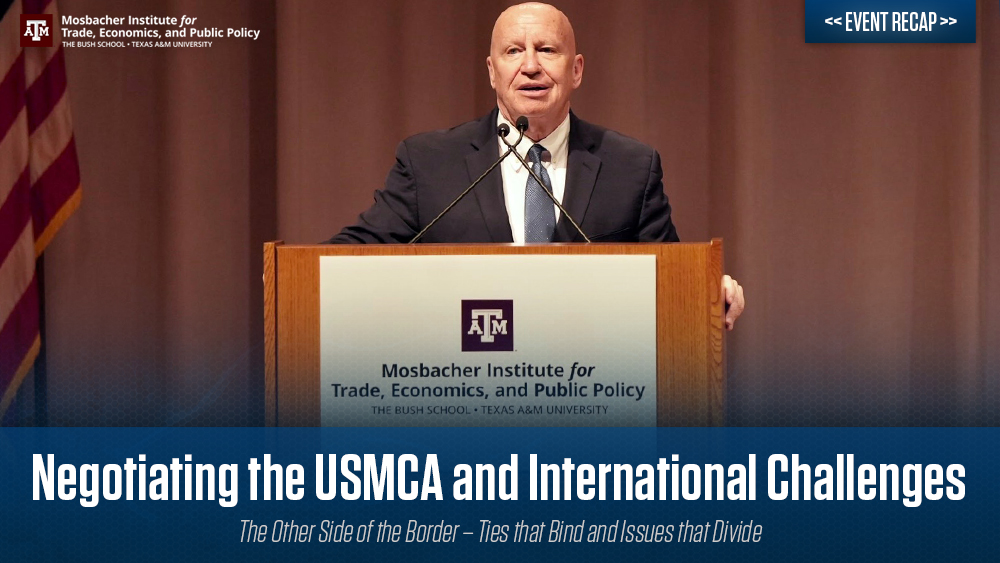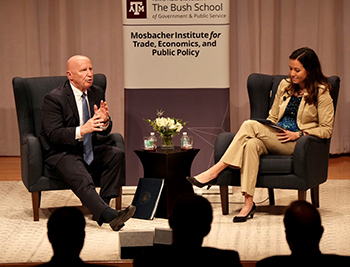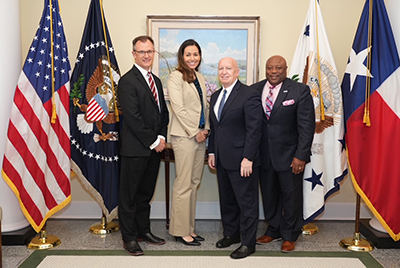
On February 23, 2022, the Mosbacher Institute’s Borders and Migration Program hosted U.S. Congressman Kevin Brady, representative of the 8th District of Texas and the Republican Leader of the House Ways and Means Committee, to talk about the domestic and international challenges related to the negotiations of the United States-Mexico-Canada Agreement (USMCA) that updated the North American Free Trade Agreement (NAFTA). The event was part of The Other Side of the Border: Ties That Bind and Issues That Divide speaker series organized by Bush School Assistant Professor Aileen Teague, who also served as moderator.

Congressman Brady opened his talk by talking about the important role President George H.W. Bush played in establishing the path for NAFTA and USMCA. He also emphasized the mentorship role that President Bush played by guiding him on the Ways and Means Congressional Committee and advising him to prioritize international trade.
Brady talked about the importance of free trade and his complete belief in its necessity. He argued that free trade is essential for preserving the individual and collective rights of Americans to buy, sell, and compete anywhere in the world. Equally important, he added, is that free trade ensures that decision-making power rests with consumers, rather than governments or special interests groups. Moreover, Brady argued that free trade has the power to lift individuals, communities, and entire countries out of poverty, and leads to higher incomes, more economic growth, improved human rights, and stronger environmental protections.
Brady then talked about the success that NAFTA had after its inception in 1992. The agreement quadrupled trade among its parties, increased the production and sale of made-in-America products, and led to more integrated supply chains that combined the strength of the three countries, helping them to compete globally. Further, he added that NAFTA played a positive role in strengthening Mexico’s democracy and human rights and helped make the country more stable and prosperous. Nonetheless, he argued that the agreement could not keep up with the constant developments in the world economy. As more countries around the world signed trade agreements, and as economies, technologies, and consumer demands continued to evolve, he argued, it was necessary to forge a new agreement with Mexico and Canada.

Brady explained that the USMCA maintained the successful aspects of NAFTA, including zero tariffs on all US exports to Mexico and nearly all the products exported to Canada. He illustrated that USMCA was not only about increasing the quantity of trade among the three countries, but also the quality of the provisions governing trade among them. He added that the agreement aimed at locking-in key Mexican reforms in energy and telecommunication, created a level playing field for financial services and investments, and established better digital trade rules to give the parties the edge in the global digital economy. Furthermore, the agreement addressed barriers beyond the borders, which was not a feature of older agreements, including NAFTA. As a result, the three countries are removing barriers that discriminated against each other’s products and services, modernizing their customs procedures, and preventing government-owned enterprises from distorting competition with private businesses.
Finally, Brady talked about the significance of the agreement for the United States. In particular, the agreement benefited the American auto industry, which had been affected by the artificially low wages in Mexico. Changes that the USMCA brought about, however, have helped the industry to generate over $34 billion in investments, create 67,000 jobs, and provide higher wages for the workers. He concluded his speech by talking about the significance of the bipartisan support for the agreement in the United States, which had not been seen in years.
Earlier in the day, Brady met with Bush School students with a concentration in Latin America to discuss domestic and foreign policy issues more broadly. The students were extremely appreciative of the Congressman’s time.
You can view Congressman Kevin Brady’s talk on the Bush School YouTube Channel.

